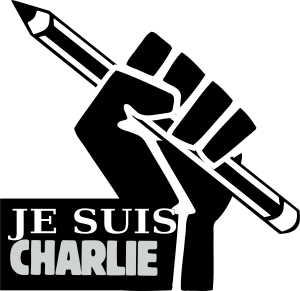The recent slaughters of hundreds of innocent civilians in Paris, in Ankara, in Beirut, and aboard the Russian Metrojet Flight 9268 illustrate without a shadow of doubt that the threat from the barbaric sect known as ISIS, ISIL, Daesh, and the Islamic State cannot be contained within the Middle East. ISIS is an enemy of humanity, decency, and Western civilization. It will continue killing completely peaceful civilians of Western nations, both in their home countries and abroad, in gruesome ways. ISIS is a cancer upon humanity, and it will continue to metastasize and inflict damage until it is either eradicated or until it completely kills its host. Like cancer, ISIS cannot coexist with a healthy humankind. This cancerous “Islamic State” should be eradicated using the resources of any willing parties.
Now is the time to put aside petty rivalries, animosities, and power politics among advanced nations. All of Western civilization – indeed, the entire world – needs to stand with the people of France and recoil at the atrocities perpetrated against the victims of the Paris attacks of November 13, 2015. There can be no excuses and no apologies for the perpetrators. Anti-modern fundamentalist savagery must be condemned, and the innocent should be mourned. Western civilization needs to send a unified signal that it will have no tolerance for murderous intolerance.
 A concerted, multifaceted strategy is needed to eliminate ISIS while preserving the Enlightenment values which ISIS threatens: liberty, humanism, secularism, tolerance, and progress. No single measure will succeed in solving this dire problem, but a combination of approaches can dramatically reverse the current predicament of Western civilization suffering setback after setback due to the rampages of a relatively small group of barbarians. The representatives of Western civilization should mount a decisive, unapologetic response that not only physically destroys ISIS but also eliminates the societal, economic, and cultural preconditions for its emergence.
A concerted, multifaceted strategy is needed to eliminate ISIS while preserving the Enlightenment values which ISIS threatens: liberty, humanism, secularism, tolerance, and progress. No single measure will succeed in solving this dire problem, but a combination of approaches can dramatically reverse the current predicament of Western civilization suffering setback after setback due to the rampages of a relatively small group of barbarians. The representatives of Western civilization should mount a decisive, unapologetic response that not only physically destroys ISIS but also eliminates the societal, economic, and cultural preconditions for its emergence.
If I had the ability to set the United States’ policy for eliminating the ISIS menace, I would institute the measures described below as expeditiously as possible. I estimate that, within approximately one year of the implementation of these measures, ISIS would be completely destroyed, and the probability of any successor organizations emerging would be rendered negligible through the continued application of these approaches.
(1) Setting Aside Foreign-Policy Differences: ISIS threatens everyone – citizens of France, Russia, Turkey, Iran, and the United States, to name just a few. Now is the time to pursue complete cooperation among the governments of countries which have a compelling interest to eradicate ISIS. To achieve such cooperation, the United States government should send a strong signal that all other foreign-policy differences are relatively unimportant and will be overlooked. For instance, with regard to Russia, the United States should openly renounce all strategic ambitions in Ukraine and all intentions to depose the Syrian regime of Bashar al-Assad. The cessation of the demonization of Russia over the Ukrainian civil war (where there is truly no good side) would serve as a major sign to Vladimir Putin of the United States’ goodwill and desire to collaborate on a true existential threat to Western civilization. As for Assad, he – for all of his despicably dictatorial behavior – is an enemy of ISIS, and ISIS would not have emerged had the United States not previously funneled weapons and training to anti-Assad rebels, who either were quickly overwhelmed by the more ruthless ISIS or themselves joined ISIS. For ISIS to be eradicated, Syria’s civil war must end, and peace and order must be restored. Assad may be a dictator, but he does not instigate hostage-takings and mass murders in European cities. Likewise, the United States government should welcome support from Iran in combating the ISIS presence within Iraq. ISIS is a fanatically intolerant Sunni Muslim sect that poses as much of a threat to the Shiite Muslim theocracy of Iran as it does to non-Muslim “infidel” Westerners. A collaborative effort to defeat ISIS would also help to defuse tensions between the United States and Iran by demonstrating to the Iranian regime that the United States does not have imminent intentions to “preemptively” attack Iran out of the (largely unfounded) fear of the continued development of Iran’s nuclear program.
 (2) Targeted Multinational Expeditionary Force: It is possible that France will invoke Article 5 of the North Atlantic Treaty, which pledges other members of NATO to come to its defense as a result of the attack by ISIS against French civilians on French soil. While I question the wisdom of the continuation of the NATO arrangement generally, it may be useful for achieving a coordinated response to the ISIS threat in particular. Furthermore, all willing non-NATO powers, including Russia and China, should be invited to take part in the response. ISIS has murdered citizens of the United States, the United Kingdom, Japan, France, Turkey, Russia, and many other countries. Every country can claim with some justification that ISIS is waging war upon its people.
(2) Targeted Multinational Expeditionary Force: It is possible that France will invoke Article 5 of the North Atlantic Treaty, which pledges other members of NATO to come to its defense as a result of the attack by ISIS against French civilians on French soil. While I question the wisdom of the continuation of the NATO arrangement generally, it may be useful for achieving a coordinated response to the ISIS threat in particular. Furthermore, all willing non-NATO powers, including Russia and China, should be invited to take part in the response. ISIS has murdered citizens of the United States, the United Kingdom, Japan, France, Turkey, Russia, and many other countries. Every country can claim with some justification that ISIS is waging war upon its people.
The key for a successful international response against ISIS is to target the response against the actual, known members of ISIS and to minimize damage to innocent civilians. Instead of indiscriminate aerial bombing campaigns or conventional military offensives, a far superior tactic would be to assemble multinational teams of highly trained commandos who would infiltrate key ISIS bases and assassinate the leaders of ISIS, while also sabotaging ISIS’s logistical systems and preventing ISIS from obtaining weaponry and other materiel required for continuing military operations. No civilians should be caught in the crossfire. Instead, the multinational commando teams should actively recruit local residents, who are suffering under the yoke of ISIS in Syria and Iraq, into auxiliary roles. The support of locals could assist with obtaining more reliable on-the-ground intelligence and also in building goodwill for the ouster of ISIS from the communities it currently terrorizes.
While this expeditionary force should be completely friendly to local civilians, it should be completely merciless toward any ISIS fighters. Anyone who has fought and killed on ISIS’s behalf has renounced his right to life by depriving others of their lives in horrific ways. The expeditionary force should be authorized to execute confirmed ISIS fighters, but not to torture or humiliate them. This restraint from savage behavior would illustrate the stark moral contrast between the West and ISIS. ISIS has engaged in outrageous acts of perversion – essentially committing every type of violation of human beings imaginable. The West needs to show that its representatives will only use deadly violence in retaliation and only against those who initiated its use – and even then in a surgical, professional manner necessary to eliminate the threat but to go no further. Moreover, anyone who provides physical support to ISIS but does not directly perpetrate violence, should be arrested and subjected to an on-the-ground military tribunal aimed at procuring a swift determination of guilt or innocence and a proportional punishment in the event of guilt – instead of the prolonged limbo that has characterized American detention facilities of terrorism suspects in the past.
(3) Replacing Bombs with Information: The drone killings perpetrated by the Obama administration during this decade have inflamed the ire of anti-Western militants and have radicalized large segments of the Middle East in reaction to indiscriminate killings of civilians via “signature strikes” that presuppose that any men in their prime are terrorist militants. The problem is not with the drone technology, but rather with the payload that it carries. If bombs and missiles are replaced with informational leaflets, USB drives, and small samples of the material abundance of Western civilization, then this more benevolent use of drones can help convince Middle Eastern residents that ISIS is the path toward suffering, whereas embracing modernity and Western values would be the path toward universal prosperity and happiness. The more Middle Eastern residents find out about Western technologies, philosophies, and opportunities made available within a free, tolerant, hyper-pluralistic society, the less inclined they will be to embrace a Dark-Age mentality of brutally enforced homogeneity.
(4) Elimination of Indiscriminate Surveillance; Escalation of Targeted Surveillance: The indiscriminate electronic surveillance perpetrated by Western governments – particularly those of the United States and the United Kingdom – against their own populations, has clearly not helped to prevent murderous terrorist attacks. Instead, surveilling everyone not only grossly violates individual liberty, but also dissipates the limited resources that could more effectively be prioritized toward known troublemakers. All mass surveillance should cease, but efforts at sophisticated, targeted surveillance of individual terrorism suspects should be escalated. The surveillance itself can be sufficiently surgical as to be non-intrusive to the daily lives of those being surveilled, as long as no imminent threat exists, but should enable a swift response if any plans to do harm are discovered. Surveillance should be focused exclusively on the following categories of individuals: (1) those known to have organizational ties with ISIS, al-Qaeda, or other Islamist terrorist groups; (2) those who, in any medium, espouse militant Islamic fundamentalist views, including anyone who asserts that it is acceptable to kill in the name of Islam; and/or (3) those who originate from majority-Muslim countries and have violent criminal records. This targeted surveillance would not constitute racial or religious profiling, since all peaceful and respectable Muslims (those whose views are compatible with modern Western civilization), as well as peaceful non-Muslim emigrants from majority-Muslim countries, would be spared any surveillance. However, any Islamic fundamentalist who believes in the acceptability of religiously motivated killings, as well as any person connected to the terrorist organizations or known to have committed violent crime that might have any relation to Islamist convictions or influences, should be subjected to additional scrutiny to enable the development of an accurate and comprehensive understanding of the sources of risk facing the Western world. Most importantly, it is time to jettison the political correctness that subjects any non-Muslims to this preemptive surveillance. The threat is one of Islamic fundamentalist terrorism. Non-Muslims are not part of the threat by definition and could not possibly be allies or associates of ISIS. Emphatically, this is not to say that all Muslims are part of the threat; rather, it is simply to recognize that surveilling non-Muslims is a waste of resources as well as a hyper-intrusive violation of the liberties of completely innocent people. The following diagram illustrates the simple insight that could channel limited surveillance capabilities toward detecting actual threats.
Diagram of Possible Sources of Threats of Islamist Terrorism
 (5) Technological and Economic Transformation of the Middle East through Innovation and Freedom of Exchange: Organizations like ISIS are only able to emerge in a deeply backward cultural, societal, and economic environment, where the embrace of violent, totalitarian seventh-century dogmas could appear even remotely attractive to an uneducated populace with miserable future prospects. Only by a fundamental modernizing, Westernizing transformation can the Middle East escape its current status as a fertile breeding ground for violent fundamentalist criminals. Only by seeing the West as a source of enlightenment and economic prosperity can the populations of the Middle East cease viewing ISIS and similar groups as bulwarks against a perceived Western threat. Therefore, Western governments should lift all political barriers to the free flow of goods and ideas between Western and Middle Eastern countries. All sanctions, embargoes, tariffs, and quotas should be abolished, and the way cleared for the import of technologies and products, as well as the establishment of major branches of Western companies in Middle Eastern countries. In particular, emerging technologies that have the potential to vastly alleviate material scarcity should be encouraged. Biotechnology, including genetic modification, is particularly promising in this respect. As futurist B.J. Murphy pointed out, in response to my analogy between ISIS and cancer, “Like cancer, [which] lately we’ve been using gene editing techniques to finally start punching holes into its existence, maybe we’ll begin using those same techniques to effectively combat against ISIS – genetically modified soldiers to fight, genetically modified crops to combat hunger and malnutrition, and a genetically modified ecosystem to combat poverty.” In a strategy that would constitute the opposite of erecting trade barriers, Western governments should become agents of economic liberalization. They should actively pressure Middle Eastern regimes to accept the importation of genetically modified crops and to amend local laws to permit cutting-edge biotechnological research and experimentation. As a pathway toward economic prosperity, majority-Muslim Middle Eastern nations should emulate an outlier in their region – Israel. Despite its relatively tiny size and the near-constant hostilities in its vicinity, Israel has prospered through the tremendous innovativeness and technological capital of its people. It is an example of how to thrive by cultivating an advanced, technologically oriented economy.
(5) Technological and Economic Transformation of the Middle East through Innovation and Freedom of Exchange: Organizations like ISIS are only able to emerge in a deeply backward cultural, societal, and economic environment, where the embrace of violent, totalitarian seventh-century dogmas could appear even remotely attractive to an uneducated populace with miserable future prospects. Only by a fundamental modernizing, Westernizing transformation can the Middle East escape its current status as a fertile breeding ground for violent fundamentalist criminals. Only by seeing the West as a source of enlightenment and economic prosperity can the populations of the Middle East cease viewing ISIS and similar groups as bulwarks against a perceived Western threat. Therefore, Western governments should lift all political barriers to the free flow of goods and ideas between Western and Middle Eastern countries. All sanctions, embargoes, tariffs, and quotas should be abolished, and the way cleared for the import of technologies and products, as well as the establishment of major branches of Western companies in Middle Eastern countries. In particular, emerging technologies that have the potential to vastly alleviate material scarcity should be encouraged. Biotechnology, including genetic modification, is particularly promising in this respect. As futurist B.J. Murphy pointed out, in response to my analogy between ISIS and cancer, “Like cancer, [which] lately we’ve been using gene editing techniques to finally start punching holes into its existence, maybe we’ll begin using those same techniques to effectively combat against ISIS – genetically modified soldiers to fight, genetically modified crops to combat hunger and malnutrition, and a genetically modified ecosystem to combat poverty.” In a strategy that would constitute the opposite of erecting trade barriers, Western governments should become agents of economic liberalization. They should actively pressure Middle Eastern regimes to accept the importation of genetically modified crops and to amend local laws to permit cutting-edge biotechnological research and experimentation. As a pathway toward economic prosperity, majority-Muslim Middle Eastern nations should emulate an outlier in their region – Israel. Despite its relatively tiny size and the near-constant hostilities in its vicinity, Israel has prospered through the tremendous innovativeness and technological capital of its people. It is an example of how to thrive by cultivating an advanced, technologically oriented economy.
(6) Preserving Individual Liberty at Home: The multifaceted efforts to eradicate ISIS should have absolutely no effect on the freedoms and opportunities available to Americans and other residents of Western nations. It is necessary to decisively illustrate just how unlike the totalitarian ideal of ISIS the Western world is. If those who claim that the Islamist fanatics “hate us for our freedoms” have a grain of truth to their statement, then it is all the more imperative to proudly assert those freedoms, instead of suppressing them in the name of “security” or avoiding offense. Western governments should explicitly reaffirm the protection of free speech and the absolute freedom of individuals to engage in anti-religious expression. The US Congress should pass a resolution strongly supporting the right of any individual to “blaspheme” against any religion, for any reason – justified or not. All blasphemy laws in all Western countries should be repealed, and all politicians should take an explicit stand in favor of tolerance for “blasphemous” speech, no matter whom it might offend. As with the shift from mass to targeted surveillance, all screenings at airports, border crossings, and other mass-transit locations should focus away from the general population and toward Islamist fundamentalist fanatics and likely terror suspects. As a result of this refocusing of resources, for every single suspected Islamist plot, a team of police and intelligence experts should be constantly aware of the status of the threat and prepared to launch a sophisticated response with minimal or no disruption to the general public. Everyone else should be enabled to lead peaceful, dignified lives where the government does not violate the physical bodies or private information of the innocent – similar to the situation for most people in Western countries during the late 1990s.
A successful campaign to defeat ISIS would need to achieve a short-term goal and a long-term goal. The short-term goal – the physical eradication of ISIS – can be accomplished within a year if major world powers set aside their foreign-policy differences and deploy a merciless but scrupulously moral expeditionary force, combined with a powerful informational campaign that transforms tools of destruction into vehicles of Enlightenment. The long-term goal is the modernization and Westernization of the Middle East – the emergence of widespread economic prosperity and major technologically driven uplifting of living standards. The secularization of Middle Eastern governments and the development of more tolerant, enlightened variants of Islamic theology – akin to the transformation of Christianity during the 18th-century Enlightenment in the West – should also be encouraged. To achieve this long-term goal, Western civilization must stand proud once more and cease apologizing for its technological, economic, and cultural superiority to the contemporary Middle East. As beneficial side effects of the struggle against ISIS, the Western world might rediscover the values of the Enlightenment that have been so vital to its progress to date – and reapply and disseminate these universally desirable values in a more potent, assertive form. Furthermore, standing united against ISIS will help avoid needless hostilities among the United States, Russia, China, and Iran and thereby strengthen the prospect for peaceful coexistence among all who value it.


















